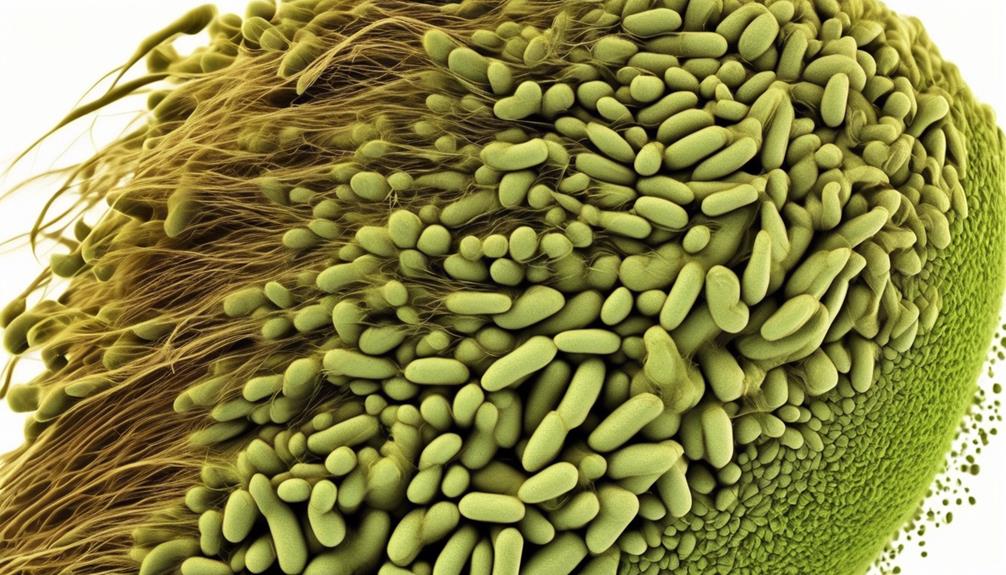Imagine running your fingers through your once thick and lustrous hair, only to find strands slipping away like whispers in the breeze. Hair loss can be a distressing experience, and if you're someone who uses kratom, you may be wondering if there's a connection between this natural supplement and your thinning locks. In this discussion, we will explore the potential link between hair loss and kratom, uncover the scientific evidence behind it, and offer valuable insights on prevention and treatment. So, if you're concerned about your hair's well-being and seeking answers, you're in the right place. Stay tuned to unravel the truth about hair loss and kratom.
The Potential of Kratom for Hair Growth
The potential for hair growth through the use of kratom remains an area of interest, although limited scientific evidence and predominantly anecdotal reports currently exist on the subject. While some anecdotal claims suggest that kratom causes hair loss, scientific research on the relationship between kratom and hair growth is sparse. There are no specific studies that directly investigate the impact of kratom on hair growth or the compounds in kratom that may contribute to hair loss.
However, it is important to note that hair loss can be influenced by various factors such as hormonal changes, nutritional deficiencies, stress response, and immune system function. These factors may also be associated with kratom use. For instance, excessive kratom consumption may disrupt hormone levels, leading to hair thinning or loss. Similarly, nutritional deficiencies resulting from poor diet or inadequate absorption can contribute to hair loss.
While there is no scientific evidence linking kratom directly to hair growth, it is worth considering that maintaining a balanced diet rich in essential nutrients and practicing stress management techniques can benefit overall hair health. Additionally, re-growing hair lost due to kratom use may require addressing the underlying factors contributing to hair loss, rather than relying solely on kratom.
Understanding the Link Between Kratom and Hair Loss
While scientific evidence is currently lacking, there have been self-reported claims of a potential link between kratom use and hair loss. It is important to note that these claims are primarily anecdotal and have not been conclusively supported by research. However, it is worth exploring the possible connection between kratom and hair loss.
Kratom is a plant native to Southeast Asia and is known for its active ingredients, such as mitragynine and 7-hydroxymitragynine, which interact with opioid receptors in the brain. While the effects of these active ingredients on hair health have not been extensively studied, some users have reported experiencing thinning hair or hair loss while using kratom.
The exact cause of hair loss in kratom users is still unclear. It is possible that long-term, high-dose kratom use may contribute to hair loss as a potential side effect. This could be due to the impact of kratom on hormones or hair follicles. However, further scientific research is needed to establish a definitive link between kratom use and hair loss.
If you are experiencing hair loss and are a kratom user, it is important to consult with a healthcare professional. They can help identify the underlying cause of your hair loss and discuss potential treatment options. It is essential to address any underlying health conditions that may be contributing to hair loss, as well as explore hair regrowth treatments if necessary.
Regardless of kratom usage, maintaining overall hair health is crucial. This can be achieved by following a balanced diet, practicing gentle hair care, and managing stress levels. These steps can help support hair growth and minimize the risk of hair loss.
Treatment Options for Kratom-Induced Hair Loss

To effectively address kratom-induced hair loss, it is essential to consult with a healthcare professional to determine the underlying cause and discuss appropriate treatment options. Here are three potential treatment options for kratom-induced hair loss:
- Discontinue Kratom Use: If hair loss is determined to be related to telogen effluvium caused by kratom usage, the first step is to stop using kratom. This allows the hair follicles to enter the regrowth phase and potentially restore normal hair growth.
- Explore Hair Growth Treatments: Under the guidance of a healthcare professional, you may consider using hair growth treatments such as finasteride and minoxidil. Finasteride works by blocking the conversion of testosterone into dihydrotestosterone (DHT), which can contribute to hair loss. Minoxidil, on the other hand, is a topical solution that stimulates hair regrowth.
- Prioritize Overall Health and Hair Care: It is important to take care of your overall health and hair to support hair regrowth. Maintain a balanced diet that includes essential nutrients like vitamins A, C, and E, as well as biotin and iron. Avoid excessive heat styling and chemical treatments that can further damage the hair. Managing stress levels can also help promote healthy hair growth.
While these treatment options have not been scientifically proven specifically for kratom-induced hair loss, they are commonly used for addressing hair loss caused by other factors. It is important to remember that hair loss can have various causes, and consulting with a healthcare professional is crucial for accurate diagnosis and personalized treatment. Clinical trials and research studies exploring the relationship between kratom and hair loss are limited, so treatment options may vary based on individual circumstances.
Tips for Preventing Hair Loss While Using Kratom
When using kratom, it is important to follow these tips to prevent hair loss and maintain healthy hair. Hair loss, or hair thinning, can be a concern for some individuals who use kratom. However, by implementing certain measures, you can promote hair health and minimize the risk of hair loss while using kratom.
Firstly, it is crucial to monitor your kratom intake. Maintaining a low to moderate dosage of kratom can help prevent excessive hair loss. This is because high doses of kratom may potentially disrupt the natural growth cycle of hair follicles, leading to hair thinning. By keeping your dosage in check, you can minimize this risk and maintain a healthy head of hair.
In addition to monitoring your kratom intake, paying attention to your nutritional balance is essential. A well-balanced diet that includes essential nutrients such as vitamins A, C, E, and B complex, as well as minerals like zinc and iron, can support hair health. These nutrients are vital for hair follicles to grow and promote hair re-growth. Incorporating foods rich in these nutrients into your diet, such as fruits, vegetables, lean proteins, and whole grains, can help maintain healthy hair while using kratom.
Stress management is another important factor in preventing hair loss. Stress can contribute to hair thinning, and kratom users may be more prone to experiencing stress-related hair loss. Therefore, practicing stress-relief techniques such as meditation, yoga, or engaging in hobbies can help minimize the impact of stress on your hair health.
Furthermore, choosing high-quality kratom products is crucial. Reputable vendors who provide pure and unadulterated kratom can help prevent any harmful additives that may contribute to hair loss. By opting for trusted sources, you can ensure that you are consuming a safe product that won't negatively affect your hair follicles.
Lastly, if you experience hair loss while using kratom, it is advisable to seek professional guidance. Consulting with a healthcare professional can help determine the underlying cause and provide appropriate treatment options. They may recommend specific hair care products, supplements, or lifestyle changes to promote hair re-growth and prevent further hair loss.
The Science Behind Kratom's Effects on Hair Loss

If you're curious about the potential effects of kratom on hair loss, it's important to explore the scientific research behind this topic. While there is limited scientific evidence directly linking kratom to hair loss, there are several factors that may contribute to its potential impact on hair health. Here are three key points to consider:
- Interaction with the mu opioid receptor: Kratom contains active compounds that interact with the mu opioid receptor in the brain. This interaction may have implications for stress and inflammation, which are known to be linked to hair loss. However, the exact mechanisms by which kratom affects hair health are not yet fully understood.
- Hormonal balance and nutritional deficiencies: Anecdotal reports suggest that prolonged, excessive kratom use may lead to hair loss. This could be due to kratom's potential impact on hormonal balance and the development of nutritional deficiencies. It is important to note that these reports are based on individual experiences and further scientific research is needed to establish a definitive link.
- Immune system and scalp inflammation: Limited scientific evidence supports the possibility that kratom's influence on the immune system could lead to scalp inflammation, which may contribute to hair loss. Animal studies have shown that higher doses of kratom can trigger immune reactions and inflammation, but more research is necessary to determine if similar effects occur in humans.
It's important to approach the topic of kratom and hair loss with caution. While some reports suggest that contaminated kratom products and kratom's potential testosterone-lowering effects may also contribute to hair loss, more studies are needed to confirm these associations. If you have concerns about hair loss or any other health issues related to kratom usage, it is advisable to consult with a healthcare professional.
Frequently Asked Questions
What Drug Makes Your Hair Thin?
If you're wondering what drug can make your hair thin, there are several possibilities to consider. Certain medications, such as chemotherapy drugs, can cause temporary hair loss. Lifestyle factors like stress, poor nutrition, and excessive styling can also contribute to hair thinning. There are common misconceptions about hair thinning, such as the belief that washing your hair too frequently can cause it. To promote hair growth, you might consider using nutritional supplements and practicing healthy hair care habits. Remember, genetics also play a role in hair thinning.
What Drug Stops Hair Growth?
If you're wondering about a drug that could potentially hinder hair growth, it's important to consider various factors before jumping to conclusions. While there are no specific drugs that universally stop hair growth, certain medications or health conditions may contribute to hair loss. It's always best to consult with a healthcare professional who can provide personalized advice and explore natural remedies, lifestyle changes, and other prevention techniques to promote healthy hair growth.
How Long Does Drug Induced Hair Loss Last?
If you're experiencing drug-induced hair loss, it's essential to understand how long it may last. Factors like metabolism, dosage, and duration of drug use can influence the duration. Consult a healthcare professional for a specific timeline and potential recovery. After discontinuing the drug, hair may gradually start regrowing, but it can take months. Other factors like overall health, genetics, and concurrent medications can also affect the duration and recovery. Seek professional advice and explore effective remedies and natural ways to promote hair regrowth.
What Does Chinese Medicine Say About Hair Loss?
In Chinese medicine, hair loss is believed to be linked to imbalances in your body's vital energy and blood circulation. Traditional remedies such as acupuncture therapy, herbal formulations, and dietary recommendations are used to restore balance and promote hair growth. The Qi deficiency theory and the concept of Yin and Yang balance play crucial roles in addressing hair loss. Scalp massage techniques, topical treatments, stress management, and the use of essential oils are also emphasized to support healthy hair growth.










